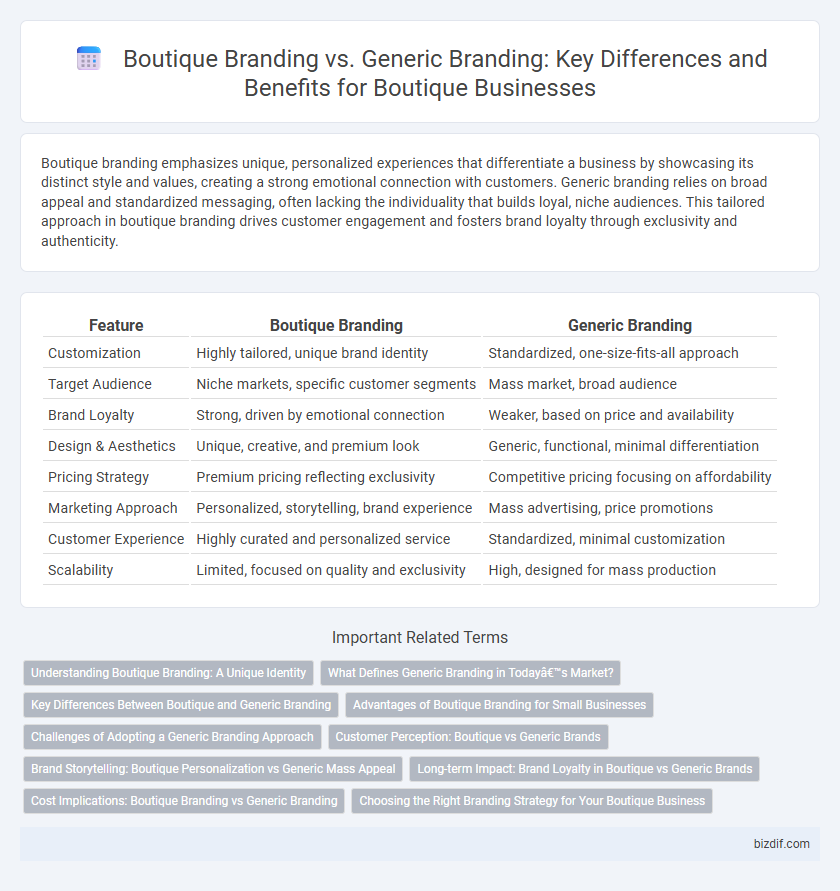Boutique branding emphasizes unique, personalized experiences that differentiate a business by showcasing its distinct style and values, creating a strong emotional connection with customers. Generic branding relies on broad appeal and standardized messaging, often lacking the individuality that builds loyal, niche audiences. This tailored approach in boutique branding drives customer engagement and fosters brand loyalty through exclusivity and authenticity.
Table of Comparison
| Feature | Boutique Branding | Generic Branding |
|---|---|---|
| Customization | Highly tailored, unique brand identity | Standardized, one-size-fits-all approach |
| Target Audience | Niche markets, specific customer segments | Mass market, broad audience |
| Brand Loyalty | Strong, driven by emotional connection | Weaker, based on price and availability |
| Design & Aesthetics | Unique, creative, and premium look | Generic, functional, minimal differentiation |
| Pricing Strategy | Premium pricing reflecting exclusivity | Competitive pricing focusing on affordability |
| Marketing Approach | Personalized, storytelling, brand experience | Mass advertising, price promotions |
| Customer Experience | Highly curated and personalized service | Standardized, minimal customization |
| Scalability | Limited, focused on quality and exclusivity | High, designed for mass production |
Understanding Boutique Branding: A Unique Identity
Boutique branding creates a distinct identity by focusing on personalized customer experiences and niche market appeal, setting it apart from generic branding's broad, mass-market approach. This strategy leverages exclusivity, craftsmanship, and storytelling to foster strong emotional connections and brand loyalty. Emphasizing unique design elements and specialized services, boutique brands thrive on authenticity and targeted messaging that resonate deeply with select audiences.
What Defines Generic Branding in Today’s Market?
Generic branding in today's market is defined by standardized products and mass-market appeal, lacking unique identity or emotional connection with consumers. It relies heavily on price competition and broad distribution channels rather than personalized customer experiences or niche targeting. Such branding often sacrifices distinctiveness for cost efficiency, leading to lower brand loyalty and minimal differentiation from competitors.
Key Differences Between Boutique and Generic Branding
Boutique branding emphasizes personalized customer experiences and unique brand identity, often reflecting niche market values and artisanal quality. Generic branding typically aims for mass appeal by prioritizing broad recognition and standardized messaging to attract a wide audience. The key differences lie in customization, marketing approach, and emotional connection, with boutique brands fostering exclusivity and generic brands emphasizing consistency and scale.
Advantages of Boutique Branding for Small Businesses
Boutique branding offers small businesses the advantage of creating a unique and personalized identity that resonates deeply with niche markets, fostering stronger customer loyalty. This approach allows for tailored marketing strategies and a consistent brand narrative that highlights exclusivity and quality, setting the business apart from generic competitors. By emphasizing authentic storytelling and customized experiences, boutique branding enhances brand value and drives higher engagement and conversion rates.
Challenges of Adopting a Generic Branding Approach
Generic branding often faces significant challenges such as lack of distinctiveness and difficulty in creating emotional connections with customers, resulting in weaker brand loyalty. Unlike boutique branding, generic brands struggle to convey unique value propositions, leading to intensified competition and price sensitivity. This approach can limit differentiation opportunities, making it harder to establish a lasting presence in niche markets.
Customer Perception: Boutique vs Generic Brands
Boutique branding cultivates a distinct and personalized customer perception by emphasizing unique design, limited availability, and a strong brand story that resonates emotionally with niche markets. Generic branding often generates a perception of mass production, focusing on affordability and accessibility, which can diminish emotional connection and brand loyalty. Customers of boutique brands typically value exclusivity and craftsmanship, resulting in higher engagement and willingness to pay a premium compared to generic brand consumers.
Brand Storytelling: Boutique Personalization vs Generic Mass Appeal
Boutique branding excels in personalized brand storytelling, crafting unique narratives that deeply resonate with niche audiences through authentic experiences and tailored messaging. This personalized approach fosters strong emotional connections and loyalty, distinguishing boutique brands from generic counterparts that rely on broad, one-size-fits-all narratives aiming for mass appeal. By emphasizing individuality and exclusivity, boutique branding enhances perceived value and customer engagement beyond generic branding's focus on widespread recognition.
Long-term Impact: Brand Loyalty in Boutique vs Generic Brands
Boutique branding creates a deep emotional connection with customers through personalized experiences and unique brand identities, fostering strong brand loyalty over time. In contrast, generic branding often relies on broad appeal and price competitiveness, resulting in weaker customer retention and less emotional attachment. The long-term impact of boutique brands is evident in sustained customer engagement and higher lifetime value, which generic brands typically struggle to achieve.
Cost Implications: Boutique Branding vs Generic Branding
Boutique branding typically incurs higher initial costs due to custom design, exclusive packaging, and personalized marketing strategies tailored to niche markets. Generic branding benefits from economies of scale, resulting in lower production and marketing expenses but may lack distinct market differentiation. Investing in boutique branding can lead to higher customer loyalty and premium pricing, while generic branding emphasizes cost efficiency and broader market appeal.
Choosing the Right Branding Strategy for Your Boutique Business
Boutique branding emphasizes a unique, personalized identity that resonates deeply with a niche target audience, enhancing customer loyalty and perceived value. Generic branding targets a broader market with standardized messaging, often sacrificing distinctiveness for mass appeal. Choosing the right branding strategy for your boutique business involves assessing your customer base, market positioning, and long-term goals to create a consistent, authentic brand experience that differentiates your boutique in a competitive market.
Boutique Branding vs Generic Branding Infographic

 bizdif.com
bizdif.com